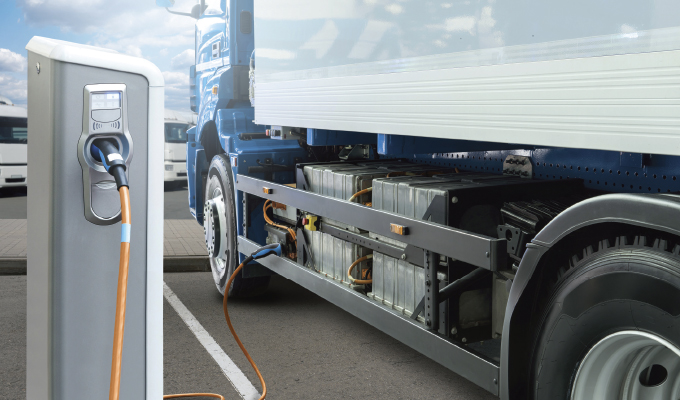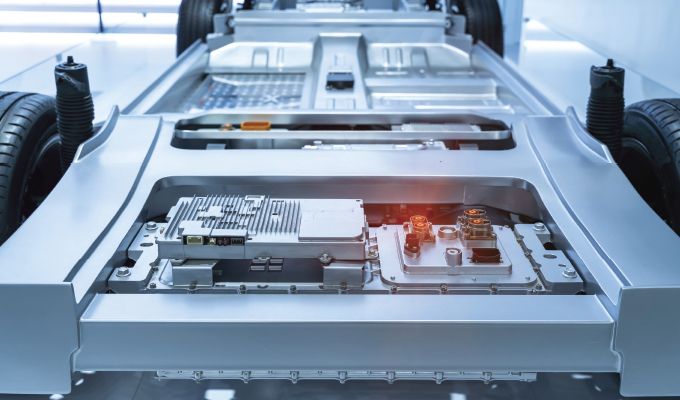As technology advances, our world changes, and it seems as though those changes take place on a daily basis. The automotive and trucking industry is also undergoing change at a rapid pace. With the introduction of electric vehicles and alternative powertrains and emissions laws being introduced at the local, state, and national level, the industry is seeing change after change.
In terms of electric vehicle transitions, more and more OEMs and other companies are stepping up to help make the shift easier for fleets and consumers alike. One company, Cox Automotive, a global automotive services and technology provider, recently announced its next step in approaching electric vehicle (EV) battery valuation and inspection. The company company is in R&D mode developing a VIN-specific battery grading system using its EV Battery Health mobile app (pilot launching soon).
Using a VIN-specific grading system, Cox Automotive is able to provide a score for each specific vehicle, including accurate information on the vehicle’s battery health. With the battery pack being the most expensive part of an EV, the information Cox Automotive provides will be invaluable for consumers and fleets considering the purchase of a used electric vehicle.
Sharing more information on the app and the benefits it will bring to fleets and consumers is Cox Automotive’s Stephanie Valdez-Streaty.

MWS: ONE OF THE MOST IMPORTANT ASPECTS OF AN ELECTRIC VEHICLE (EV) IS ITS BATTERY. WHY IS IT NECESSARY TO UNDERSTAND EV BATTERY HEALTH—OR IS IT?
VALDEZ-STREATY: The battery pack is the single most expensive part of an EV, accounting for 30 to 45% of the total cost of the vehicle. With the anticipated influx of used EVs entering the market, an EV battery health score will help drive confidence and transparency at the point of sale. Most, but not all, EV batteries are built to last. During our initial testing, the average used battery health score reported was high, with an average score of 4.6 (out of 5). However, as batteries age, the number of outliers increases, highlighting the importance of evaluating each individual vehicle.
MWS: HOW CAN COX AUTOMOTIVE HELP POTENTIAL EV OWNERS?
VALDEZ-STREATY: Our EV Battery Health tool that is in development addresses three of the top five barriers to EV adoption among non-considerers, including consumers’ concerns about low range, the cost of battery replacements, and batteries not holding their charge. Furthermore, most EV considerers would consider a used EV at 90% (or 10% degradation) capacity with a battery health certificate. Ultimately, this tool could help give potential owners transparency and peace of mind knowing the condition of their used or new EV battery.
MWS: WHAT MAKES COX AUTOMOTIVE’S EV BATTERY HEALTH TOOL DIFFERENT FROM OTHER BATTERY DIAGNOSTIC TOOLS?
VALDEZ-STREATY: Typical grading systems of other EV battery diagnostic tools provide a general battery estimate based on make and model, whereas Cox Automotive’s mobile Battery Health tool directly evaluates each car and provides VIN-specific information, which is vital in capturing accurate information around the health of the battery. The tool in development will be easy-to-use and measure current battery condition, historical battery data (times, temperatures and types of charges), and performance, which our patented health algorithm then uses to produce a VIN-specific battery score ranging from 1 to 5 or potentially 0 to 100.

MWS: CAN ANYONE USE THE EV BATTERY HEALTH TOOL, OR MUST IT BE USED BY A CERTIFIED PROFESSIONAL?
VALDEZ-STREATY: Cox Automotive is planning to launch a pilot of our new EV battery health tool at 10 Manheim auction locations across the US. While dealers are an obvious future target for the easy-to-use EV battery health mobile app and Bluetooth™ dongle, the opportunities for application are endless, including service centers, fleet operators, and consumers. We are working across the organization on our plans for where to go next.
MWS: THIS TOOL HELPS POTENTIAL BUYERS UNDERSTAND THE HEALTH OF A VEHICLE’S BATTERY. BUT CAN and/or SHOULD IT BE USED AFTER THE PURCHASE AS WELL?
VALDEZ-STREATY: Yes, certainly. With internal combustion engine vehicles, mileage is king, but in the EV world, battery health is the metric. We see this tool being used to help manage the life cycle of EV batteries with real-time condition reports to monitor EV battery health and inform vehicle service needs.
MWS: DO YOU THINK THIS TOOL HAS THE POTENTIAL TO CHANGE THE WAY FLEET OWNERS/OPERATORS PURCHASE EVs?
VALDEZ-STREATY: Our small data sample of battery health metrics collected from vehicles tested at Manheim confirmed that mileage is less relevant with EVs. There was an inconsistent correlation between a battery health score and mileage on the vehicle’s odometer. This opens more purchasing opportunities for fleet operators thinking about making the switch from vehicles powered by an internal combustion engine to electric vehicles, so long as a battery health check is performed to ensure the battery is in good condition.
MWS: ADDITIONAL THOUGHTS?
VALDEZ-STREATY: We’re not just thinking about the battery component of electrification, but the whole vehicle. Vehicles are now platforms for connected software, and Cox Automotive is leading our clients through this evolution.
FOR MORE INFORMATION
As the mobility research and development director for Cox Automotive, Stephanie Valdez-Streaty is responsible for exploring new business models across the ACES (Autonomous/Aerial, Connected, Electric, Shared) portfolio of transportation. Her focus also includes developing external partnerships to create and implement a high-voltage battery ecosystem in support of Cox Automotive Mobility’s global EV Battery Services division. Previously, Valdez-Streaty was the senior director of corporate responsibility for Cox Automotive, where she was responsible for building and executing the sustainability strategy across the company. In addition to her management of the sustainability program, she also managed the corporate Go Green Council and Local Green Teams. Valdez-Streaty graduated from Stanford University with a bachelor’s degree in sociology and organizational development. Find out more, visit www.coxautoinc.com.




